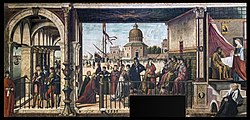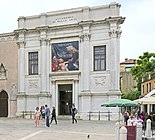File:Vittore Carpaccio 037.jpg

Original file (1,269 × 608 pixels, file size: 188 KB, MIME type: image/jpeg)
| This is a file from the Wikimedia Commons. Information from its description page there is shown below. Commons is a freely licensed media file repository. You can help. |
Summary
| Vittore Carpaccio: Arrival of the English Ambassadors
|
|||||||||||||||||||||||||
|---|---|---|---|---|---|---|---|---|---|---|---|---|---|---|---|---|---|---|---|---|---|---|---|---|---|
| Artist |
artist QS:P170,Q5581 |
||||||||||||||||||||||||
| Title |
Cycle of Saint Ursula. Arrival of the English Ambassadors. label QS:Lit,"Ciclo di Sant'Orsola. Arrivo deli ambasciatori ingress presso il re di Bretagna."
label QS:Lfr,"Cycle de Sainte Ursule. Arrivée des ambassadeurs anglais auprès du roi de Bretagne."
label QS:Lde,"Ursula Zyklus. Ankunft der englischen Gesandten beim König der Bretagne."
label QS:Len,"Cycle of Saint Ursula. Arrival of the English Ambassadors." |
||||||||||||||||||||||||
| Part of |
Legend of Saint Ursula |
||||||||||||||||||||||||
| Object type |
painting |
||||||||||||||||||||||||
| Date |
between 1495 and 1500 date QS:P571,+1500-00-00T00:00:00Z/6,P1319,+1495-00-00T00:00:00Z/9,P1326,+1500-00-00T00:00:00Z/9 |
||||||||||||||||||||||||
| Medium |
oil on canvas medium QS:P186,Q296955;P186,Q12321255,P518,Q861259 |
||||||||||||||||||||||||
| Dimensions |
height: 275 cm (108.2 in); width: 589 cm (19.3 ft) dimensions QS:P2048,275U174728 dimensions QS:P2049,589U174728 |
||||||||||||||||||||||||
| Collection |
institution QS:P195,Q338330 |
||||||||||||||||||||||||
| Current location |
room XXI (sala di Sant'Orsola) |
||||||||||||||||||||||||
| Accession number |
cat. 572 |
||||||||||||||||||||||||
| Notes |
Deutsch: Gemäldeserie aus 9 Werken, Auftraggeber: Scuola di Sant' Orsola in Venedig |
||||||||||||||||||||||||
| References | |||||||||||||||||||||||||
| Source/Photographer |
The Yorck Project (2002) 10.000 Meisterwerke der Malerei (DVD-ROM), distributed by DIRECTMEDIA Publishing GmbH. ISBN: 3936122202. Web Gallery of Art: reference_wga QS:P973,"http://www.wga.hu/html/c/carpacci/1ursula/1/10ambass.html" |
||||||||||||||||||||||||
| Permission (Reusing this file) |
[1] | ||||||||||||||||||||||||
| Other versions |
|
||||||||||||||||||||||||
| Annotations InfoField | This image is annotated: View the annotations at Commons |
Loredan's brothers
King of the Bretons Maurus
King of the Bretons Maurus
Ursula
Licensing
| Public domainPublic domainfalsefalse |
|
This work is in the public domain in its country of origin and other countries and areas where the copyright term is the author's life plus 100 years or fewer. This work is in the public domain in the United States because it was published (or registered with the U.S. Copyright Office) before January 1, 1929. | |
| This file has been identified as being free of known restrictions under copyright law, including all related and neighboring rights. | |
https://creativecommons.org/publicdomain/mark/1.0/PDMCreative Commons Public Domain Mark 1.0falsefalse
| Public domainPublic domainfalsefalse |
The work of art depicted in this image and the reproduction thereof are in the public domain worldwide. The reproduction is part of a collection of reproductions compiled by The Yorck Project. The compilation copyright is held by Zenodot Verlagsgesellschaft mbH and licensed under the GNU Free Documentation License.
|
Captions
Items portrayed in this file
depicts
File history
Click on a date/time to view the file as it appeared at that time.
| Date/Time | Thumbnail | Dimensions | User | Comment | |
|---|---|---|---|---|---|
| current | 12:04, 13 November 2009 |  | 1,269 × 608 (188 KB) | Shakko | wga |
| 05:44, 19 May 2005 |  | 4,096 × 2,008 (758 KB) | File Upload Bot (Eloquence) | {{Painting| |Title=<br /> ** ''de:'' Gemäldezyklus zur Legende der Hl. Ursula, Szene: Ankunft der englischen Gesandten am Hof des Königs der Bretagne |Technique=<br /> ** ''de:'' Öl auf Leinwand |Dimensions=<br /> ** ''de:'' 275 × 589 cm |Location=<br |
File usage
Global file usage
The following other wikis use this file:
- Usage on it.wikipedia.org
Metadata
This file contains additional information, probably added from the digital camera or scanner used to create or digitize it.
If the file has been modified from its original state, some details may not fully reflect the modified file.
| JPEG file comment | CARPACCIO, Vittore
(b. 1472, Venezia, d. 1526, Capodistria) Arrival of the English Ambassadors 1495-1500 Tempera on canvas, 275 x 589 cm Gallerie dell'Accademia, Venice Canvas No. 1 of the series of nine large paintings "Stories from the Life of St Ursula". The three paintings of the Ambassadors are evidence of the extent to which Carpaccio's feeling for colour had developed; in them the artist displays his extraordinary ability at directing or staging pageants and religious celebrations of the kind that must have been fairly frequent at the time. In the painting of the English Ambassadors' Arrival a at the Court of the King of Brittany, the first episode of the cycle of Stories from the Life of St Ursula, the splendid architectural setting, with the open loggia against the background of a view of Venice and the intimate space of the private room, divides the scene into two sections: the ambassadors deliver their message on one side and Ursula discusses the matter with her father on the other. The entire composition is arranged with absolute self-confidence and accuracy. In the diplomatic ceremony the afternoon light streams in from the left and illuminates the foreground, with patches of bright colours and sharp shadows. Below the wide portico that stretches out to the left with a row of arcades vanishing into the distance, alternating with areas of shadow, the elegant young members of the Compagnia della Calza are portrayed in poses of the most self-assured nonchalance, and showing indifference for what is happening nearby. To the right of the elaborate candelabrum, with marble and bright metal decorations, a sophisticated ornamentation that is reminiscent of the work of Ferrarese artists, the English ambassadors are received by King Maurus; they are portrayed in attitudes of deference and respect, in keeping with the rigid protocol governing public audiences granted by the Venetian Republican institutions at the time. The King sits, like the Doge, amidst his counsellors on a judgment seat against a wall covered in precious ornamented leather hangings, placed at an angle to the light and opening out onto a view of the city dominated by a round domed temple-like construction, reminiscent of Perugino and almost anticipating Baldassarre Longhena's Santa Maria della Salute. Just as the colours of the architecture are reflected in the water, so the shadows of the small figures fall like dark stripes on the red brick and white marble expanse of the square bathed in warm sunlight. Although the buildings and the landscape are quite definitely Venetian in character, it is not possible to identify them as specific constructions. And even the many identifications of the people in the painting with contemporaries of Carpaccio's are all purely hypothetical. The most fascinating theory is the identification of the man in the red cloak to the left, outside the main scene of the event, looking towards the spectator: he is traditionally supposed to be either Pietro Loredan, one of the patrons who commissioned the decoration of the Scuola, or a self-portrait. He stands in front of the iron banister enclosing the scene and appears almost to be drawing our attention towards the ambassadors and their message; like the young boy with the long feather on his cap who also looks out towards the spectator, a detail that was only recently (1983) rediscovered thanks to an excellent cleaning job. The nurse sitting at the far right in an attitude of resignation, on the other hand, introduces us to the conversation between Maurus and his daughter, which does not take place in an elegant and formal hall like the audience of the ambassador, but in the domestic intimacy of Ursula's bedroom. The King has abandoned all the official royal formalities imposed by protocol and simply listens to the conditions set out by his daughter. She will marry Ereus if she is granted a retinue of ten beautiful virgins; she and each of the ten shall further be assigned a thousand virgins each; and the young man who has asked for her hand shall be baptized and instructed in the faith for a period of three years. The two figures, father and daughter, are set against the canopy of the bed and the wall decorated with a devotional icon in an inversion of patches of colour that is almost an anticipation of the art of Paolo Veronese. And the harmony of colours with which Carpaccio depicts the old governess is equally masterful: she sits at the foot of the stairway leading to Ursula's bedroom and stares out into space, as though she knew what a tragic ending this royal wedding contract would lead to. Years later Titian was obviously so struck by this figure of the governess that he included a modern version of her in the Presentation of the Virgin that he painted between 1536 and 1538 for the Scuola Grande di Santa Maria della Carità.
Author: CARPACCIO, Vittore Title: Arrival of the English Ambassadors Time-line: 1501-1550 School: Italian Form: painting Type: religious |
|---|





